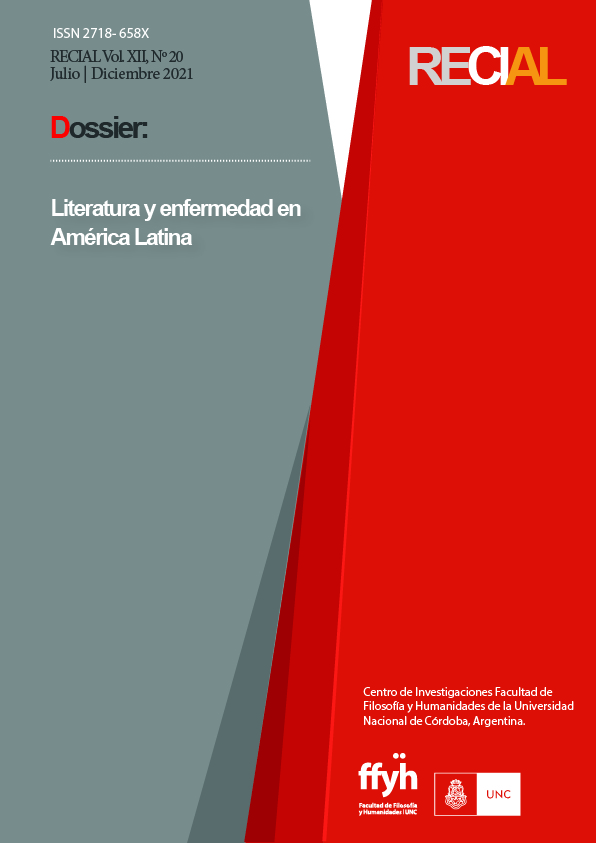Salón de belleza versus “the dispositif of the person”: body, disease and sexuality
Keywords:
Salón de belleza, body, disease, dispositif of the personAbstract
In Viajes virales (2012), Lina Meruane provides a critical reading of the literary corpus on AIDS, produced at the height of the epidemic in Latin America. In this book, the author highlights the novel Salón de belleza (1994), by Mario Bellatin, as one of the fundamental works on this theme, in which the writing of the disease denounces the extermination of the Latin American homosexual community, which would include the poor effeminate gay. The novel revolves around a cross-dresser hairdresser who, in the absence of public policies, converts his beauty salon into a ‘moridero’ to shelter the abandoned bodies of sick men who, affected by a contagious disease indirectly associated with homosexuality and AIDS, no longer fit into the category of human person, worthy of basic rights. In turn, assuming a “universal” and “disembodied” individual, the dispositif of the person, as theorized by Roberto Esposito (2009, 2011), has become the key concept that sustains human rights claims, contradictorily, so popular in contemporaneity. In light of these ideas, the aim of this paper is to analyze how Salón de belleza, by focusing on the sick and sexually dissident body, problematizes the effectiveness of the dispositif of the person to guarantee rights, revealing itself, in reality, as a biopolitical apparatus of exclusion and control of bodies: separating biologically-based on health condition, gender and sexuality- who deserves to live and who must die.
Downloads
References
Bellatin, M. (2009). Salón de Belleza. Barcelona: Tusquets.
Butler, J. (2015). Problemas de gênero: feminismo e subversão da identidade. Rio de Janeiro: Civilização Brasileira.
Esposito, R. (2009). Tercera persona: política de vida y filosofia de lo impersonal. Buenos Aires: Amorrortu.
Esposito, R. (2011). El dispositivo de la persona. Buenos Aires: Amorrortu.
Esposito, R. (2017). Bíos. Biopolítica e filosofia. Belo Horizonte: Editora UFMG.
Foucault, M. (2011). História da sexualidade I: a vontade de saber. Rio de Janeiro: Edições Graal.
Lemebel, P. (2000). Loco afán: crónicas de sidario. Barcelona: Editorial Anagrama.
Lima, D. (2020). “O Corpo-utópico como fora de resistência em meio à pandemia”. Entrevista concedida a Nuno Figuêiroa. Suplemento Pernambuco, Junho, 2020. Recuperado de https://suplementopernambuco.com.br/entrevistas/2504-o-corpo-ut%C3%B3pico-como-forma-de-resist%C3%AAncia-em-meio-%C3%A0-pandemia.html?fbclid=IwAR2Kw48MB-SEqme3fLgw6ndmMo_4tm0kC30wIsbELhXL4hY 1CGe9Cx DTJv4
Meruane, L. (2012). Viajes virales: la crisis del contagio global en la escritura del sida. Santiago: Fondo de Cultura Económica.
Sontag, S. (2007). A doença como metáfora, Aids e suas metáforas. São Paulo: Companhia das Letras.
Pires, T. R. (2020). Por uma concepção amefricana dos direitos humanos [Hollanda, Heloísa Buarque de (org.)]. Pensamento Feminista Hoje: Perspectivas Decoloniais. Rio de Janeiro: Bazar do Tempo, 2020.
Lugones, M. (2020). Gênero e colonialidade. [Hollanda, Heloísa Buarque de (org.)]. Pensamento Feminista Hoje: Perspectivas Decoloniais. Rio de Janeiro: Bazar do Tempo, 2020.
Downloads
Published
Issue
Section
License

This work is licensed under a Creative Commons Attribution-NonCommercial-ShareAlike 4.0 International License.
Aquellos/as autores/as que tengan publicaciones en esta revista, aceptan los términos siguientes:
- Los/as autores/as conservarán sus derechos de autor y garantizarán a la revista el derecho de primera publicación de su obra, el cuál estará simultáneamente sujeto a la Licencia de reconocimiento de Creative Commons que permite a terceros compartir la obra siempre que se indique su autor y su primera publicación esta revista.
- Los/as autores/as podrán adoptar otros acuerdos de licencia no exclusiva de distribución de la versión de la obra publicada (p. ej.: depositarla en un archivo telemático institucional o publicarla en un volumen monográfico) siempre que se indique la publicación inicial en esta revista.
- Se permite y recomienda a los/as autores/as difundir su obra a través de Internet (p. ej.: en archivos telemáticos institucionales o en su página web), luego de su publicación en la revista. (Véase El efecto del acceso abierto).

























